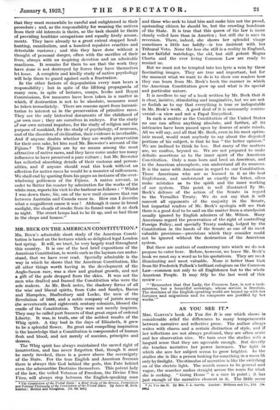MR. BECK ON THE AMERICAN CONSTITUTION.* Ma. BECK'S admirable short
study of the American Consti- tution is based on the lectures which so delighted legal London last spring. It will, we trust, be very largely read throughout this country. It is one of the best brief expositions of the American Constitution, in words such as the layman can under- stand, that we have ever read. Specially admirable is the way in which he shows that the American Constitution, like all other things worth having in the development of the Anglo-Saxon race, was a slow and gradual growth, and not a gift of the gods dropped from the skies. It was not the men who drafted and framed the Constitution who were the sole makers. As Mr. Beck notes, the shadowy forms of all the wise and liberal spirits, from Coke and Sandys, Bacon and Hampden, Shaftesbury and Locke, the men of the Revolution of 1688, and a noble company of jurists among the seventeenth and eighteenth century colonists, blessed the cradle of the Constitution. They were not merely inspirers. They may be called part framers of that great organ of ordered Liberty. It was, in truth, one of the noblest results of the Whig spirit. A tiny bud in the days of Elizabeth, it grew to be a splendid flower. Its great and compelling inspiration is the knowledge that a Constitution is compounded of human flesh and blood, and not merely of maxims, principles and decrees.
The Whig spirit has always maintained the sacred right of insurrection, and has never forgotten that, though it must be rarely invoked, there is a power above the sovereignty of the State. For the true English and American freeman there is always this God behind the gods, this Fate behind even the adamantine Destinies themselves. This potent lady of the law, the veiled Votaress of Freedom, the Divine Ultra Vires, will always step between the English-speaking man
• The Constitution of the United States : a Brief Study of the Genesis, Formulation and Political Philosophy of the Constitution of the United States. By James IL Beck. London : Hodder and Stoughton. Us. ed. net4 and those who seek to hind him and make him not the proud, upstanding citizen he should be, but the crawling bondman
of the State. It is true that this queen of the law is more closely veiled here than in America ; but still she is ours in reversion. There, indeed, she shows her splendid visage sometimes a little too boldly—is too insistent with her Tribunal Veto. None the less she still is a reality in England, as her faithful watchdogs, the old, but still potent Magna Charts and the ever living Common Law are ready to remind us.
But we must not be tempted into too lyric a vein by these fascinating images. They are true and important, but for the moment what we want to do is to show our readers how they can learn from Mr. Beck's book the manner in which the American Constitution grew up and what is its special and particular nature.
It is needless to say of a book written by Mr. Beck that it is clear, incisive, stimulating and imaginative, but we are not so foolish as to say that everything is true or indisputable in Mr. Beck's work. A good deal of it is necessarily contro- versial—a view and not a Papal Encyclical.
In such a matter as the Constitution of the United States no one can affirm anything absolute, and further, all its intricacies have been passed upon by dozens of acute minds.
All we will say, and all that Mr. Beck, even in his most optim- istic mood, would want anybody to say about the disputed portions of his subject, is that he has " the better opinion." We are inclined to think he has. But many of the matters are, we confess, beyond us. We arc not prepared to make definite assertions as to the inner spirit of the American Constitution. Only a man born and bred an American, and in the American atmosphere, can understand all its nuances.
It is the same with Americans in regard to our Constitution. Those Americans who are as learned in it as the best Englishman, and understand as exactly the letter, often make mistakes as to the spirit and the inner working of our system. This point is well illustrated By Mr. Beck's defence of the action of the Senate in regard to the Versailles Treaty. We do not say that it will convert all opponents of the majority in the Senate, but impartial readers of Mr. Beck's apologia will see that there is a good deal to be said on the matter from a standpoint usually ignored by English admirers of Mr. Wilson. Many Americans regard the preservation of the right of controlling Foreign Policy, and specially Treaty making, lodged by the Constitution in the hands of the Senate as one of its most valuable provisions—provisions which they consider could not be ignored without the destruction of the American system.
But these are matters of controversy into which we do not propose to enter here. Before, however, we leave Mr. Beck's book we must say a word as to his quotations. They are most illuminating and most valuable. None is better than that from Sir Frederick Pollock's brilliant eulogium on the Common Law—common not only to all Englishmen but to the whole American People. It may fitly be the last word of this review :—
" 'Remember that Our Lady, the Common Law, is not a task- mistress, but a bountiful sovereign, whose service is freedom. The destinies of the English-speaking world are bound up with her fortunes and migrations and its conquests are justified by her works.'


















































 Previous page
Previous page